Severe Tyrannical Behavior and ADHD Kids: What Parents Need to Know | Ryan Wexelblatt, LCSW, ADHD Dude

If you’re dealing with property destruction, aggression, threats of self-harm, physical intimidation, or school refusal when they're not getting their way from your child, it can feel like you’re walking on eggshells in your own home. What you are dealing with is not uncommon in families of children with ADHD, and doesn’t get talked about enough: severe tyrannical behavior in kids with ADHD.
As a licensed therapist and father of a son who had severe tyrannical behaviors when he was younger, I’ve heard from countless parents who feel isolated, ashamed, or judged because of their child’s behavior. These behaviors often happen behind closed doors and leave families emotionally exhausted and unsure of what to do next.
Let’s break this down and give you a clear path forward.
What are Severe Tyrannical Behaviors?
Severe tyrannical behaviors refer to behaviors that children, teens, and even young adults learn to use to take control of their home through their behavior. These behaviors often include:
- Property destruction
- Child-to-parent or child-to-sibling violence
- Physical intimidation
These behaviors are surprisingly common in children with ADHD, but they are rarely discussed. Often this is because parents feel too ashamed to speak about them.
If you’re seeing these patterns at home, especially alongside emotional outbursts or escalation, this guide to managing those early behaviors can help lay the groundwork.
Why Doesn’t It Work and Why Aren’t Parents Told?
Many families are steered toward traditional treatments after their child is diagnosed with ADHD. These often include:
- Individual therapy
- Play therapy
- Occupational Therapy
But here’s the problem.
These interventions are not effective in reducing or ending severe tyrannical behaviors in children or teens with ADHD, which is why they are not part of the American Academy of Pediatrics or the Society of Clinical Child & Adolescent Psychology ADHD treatment recommendations. For both organizations, the recommended treatment for ADHD in children six and up is parent training, combined with medication management. For children under 6, parent training is first, followed by medication use if warranted.
That’s the foundation of the ADHD Dude approach.
Could My Reactions Be Making Things Harder?
When parents respond to severe tyrannical behaviors with talking, reasoning, being overly empathetic, or threats of punishment, this emotional involvement can unintentionally make things worse.
Emotional reactivity from you, even if it comes from a place of concern, can reinforce the behavior because it teaches your child how effective these behaviors are.
If staying calm feels nearly impossible in those moments, you might find these practical strategies for keeping your composure and setting firm boundaries helpful.
For example:
- Trying to stop your child from destroying property in the moment often becomes a game to them.
- Empathizing or trying to calm them during physically aggressive outbursts normalizes child-to-parent (or child-to-sibling) violence.
- Talking too much during meltdowns typically increases emotional dysregulation.
- Responding to threats of self-harm with upset or reassurance reinforces the effectiveness of those statements.
Instead, your job is to use affective calmness and implement a plan if you want these behaviors to be significantly reduced or stopped.
What Actually Helps: A Clear, Evidence-Informed Protocol
Inside the ADHD Dude Membership, I teach a step-by-step protocol for reducing or stopping severe tyrannical behaviors. This is part of Capable & Confident (ages 4-7) and Scaffolding Better Behavior (ages 8 to 17) courses and is grounded in the evidence-based framework, Nonviolent Resistance.
Here’s an overview of the process.
- Take a firm stance
Let your child know clearly what you will no longer accept. This is not done in the heat of the moment, but during a calm time. A simple statement like,
“I do not approve of you damaging things in our home. I don’t accept that.”
It sends a powerful message without threats or ultimatums. It clearly lets your child know that you do not approve of their behavior. - Do Not Reward the Behavior with Attention
If your child threatens harm or acts destructively, avoid emotional reactions. Your goal is to communicate that these behaviors are ineffective, not powerful. As I teach in the Parent Behavior Training programs, I give purposeful recognition and praise to the behaviors you want; do not give attention or emotional reactivity to the behaviors you don’t want. - Enlist Supporters
Choose trusted adults your child respects to serve as their “supporters”. These people reach out to your child when they are struggling or after an incident. Supporters could be a grandparent, an aunt, an uncle, a family friend, or even an older cousin. Supporters do not need to be local. When supporters know the behavior and express support (not shame or judgment), it helps break the secrecy that often fuels these patterns. Often, children with ADHD want to keep these behaviors a family secret. They would not want someone they respect knowing how they treat family members. When supporters reach out to them to offer their support, they learn that these behaviors are no longer a secret, and when they occur, they will be hearing from people they respect, who want to help them. - Use an Announcement Letter
This is a written statement that communicates what you, as the parent, have been doing that has not helped and how you are going to change your behavior in response to your child’s behavior. In the announcement letter, you are not asking the child to change anything; instead, you let them know what you will change in response to their behavior.. We do this so the child knows a change is coming, and there will be a different response to their behaviors moving forward. Your child may rip it up or reject it initially, but they will notice something different. That matters. I provide examples of sample letters in the downloadables section of the membership site. - Set daily expectations for behavior and help around the house. Children need to feel useful at home and have daily responsibilities. Many families fall into a pattern of high giving and low expectations, when the parents give and give to the child, but have no expectations for cooperation at home or how family members should be treated. Giving video games, phones, and privileges without earning them for meeting daily expectations often leads to entitlement and immature behavior. We have a course called Creating Daily Expectations to help families set age-appropriate, realistic expectations.
Real Support for a Real Problem
Severe tyrannical behavior in kids with ADHD can be stressful, frightening, and emotionally draining, but it is not something you have to live with. There are clear, practical tools that work and are based on evidence.
Inside the ADHD Dude Membership, you’ll find:
- The Capable & Confident (ages 4-7) and Scaffolding Better Behavior (ages 8 to 17) courses
- Downloadable announcement letter templates and “cheat sheets” that summarize the actionable steps in each module
- The ability to attend twice-monthly office hours to have your questions answered live.
Ready to Make a Change?
You don't have to keep guessing if you’re feeling overwhelmed and unsure where to begin.
Inside the ADHD Dude Membership, I’ll explain exactly how to start changing these patterns without shame, guilt, or chaos.
FAQ:
Q: What are severe tyrannical behaviors in ADHD kids?
A: It’s when a child uses aggression, threats, or destruction to control the household. It’s more common than most people realize, and very isolating for parents.
Q: Why isn’t therapy working?
A: Traditional therapies like talk or play therapy aren’t effective for stopping these behaviors. The recommended approach is parent training, with medication when appropriate.
Q: Can my reactions be making it worse?
A: Yes. Emotional responses like over-explaining or trying to reason can unintentionally reinforce the behavior.
Q: What actually helps?
A: A calm, structured plan that includes clear boundaries and support from trusted adults your child respects.
Q: Where can I get help with this?
A: Inside the ADHD Dude Membership, where we teach a clear protocol that’s grounded in evidence.










